 Tìm kiếm
Tìm kiếm
Phần thứ chín Bộ luật tố tụng dân sự 2015: Thi hành bản án, quyết định dân sự của tòa án
| Số hiệu: | 92/2015/QH13 | Loại văn bản: | Luật |
| Nơi ban hành: | Quốc hội | Người ký: | Nguyễn Sinh Hùng |
| Ngày ban hành: | 25/11/2015 | Ngày hiệu lực: | 01/07/2016 |
| Ngày công báo: | 29/12/2015 | Số công báo: | Từ số 1251 đến số 1252 |
| Lĩnh vực: | Thủ tục Tố tụng | Tình trạng: | Còn hiệu lực |
TÓM TẮT VĂN BẢN
Bộ luật tố tụng dân sự 2015 được ban hành ngày 25/11/2015 với nhiều quy định về thẩm quyền của Tòa án; cơ quan tiến hành tố tụng, người tiến hành tố tụng; thành phần giải quyết việc dân sự; người tham gia tố tụng; chứng minh, chứng cứ; biện pháp khẩn cấp tạm thời; chi phí tố tụng;…
Bộ luật tố tụng dân sự năm 2015 gồm 10 Phần, 42 Chương, 517 Điều (Thay vì Bộ luật Tố tụng dân sự 2004 chỉ gồm 9 Phần, 36 Chương, 418 Điều). BLTTDS 2015 có bố cục gồm các Phần sau:
- Những quy định chung
- Thủ tục giải quyết vụ án tại Tòa án cấp sơ thẩm
- Thủ tục giải quyết vụ án tại Tòa án cấp phúc thẩm
- Giải quyết vụ án dân sự theo thủ tục rút gọn
- Thủ tục xét lại bản án, quyết định đã có hiệu lực pháp luật
- Thủ tục giải quyết việc dân sự
- Thủ tục công nhận và co thi hành tại Việc Nam hoặc không công nhận bản án, quyết định dân sự của Tòa án nước ngoài; công nhận và cho thi hành phán quyết của trọng tài nước ngoài
- thủ tục giải quyết vụ việc dân sự có yếu tố nước ngoài
- Thi hành Bản án, quyết định dân sự của Tòa án
- Xử lý hành vi cản trở hoạt động tố tụng, khiếu nại, tố cáo trong tố tụng
Theo đó, Bộ luật TTDS 2015 có những điểm sau đáng chú ý:
- Bổ sung mới quy định về Giải quyết vụ việc dân sự trong trường hợp chưa có điều luật để áp dụng:
+ Thẩm quyền của Tòa án thụ lý, giải quyết vụ việc dân sự trong trường hợp chưa có điều luật để áp dụng được thực hiện theo các điều từ Điều 35 đến Điều 41 của Bộ luật tố tụng dân sự năm 2015.
+ Trình tự, thủ tục thụ lý, giải quyết vụ việc dân sự theo Bộ luật số 92/2015/QH13.
+ Nguyên tắc giải quyết vụ việc dân sự trong trường hợp chưa có điều luật để áp dụng thực hiện theo Điều 45 Luật này về việc áp dụng tập quán, áp dụng tương tự pháp luật, áp dụng các nguyên tắc cơ bản của pháp luật dân sự, án lệ, lẽ công bằng.
- Phiên họp kiểm tra việc giao nộp, tiếp cận, công khai chứng cứ và hòa giải
Thẩm phán tiến hành mở phiên họp kiểm tra việc giao nộp, tiếp cận, công khai chứng cứ và hòa giải giữa các đương sự. Trước khi tiến hành phiên họp, Thẩm phán phải thông báo cho đương sự, người đại diện hợp pháp của đương sự, người bảo vệ quyền và lợi ích hợp pháp của đương sự về thời gian, địa điểm tiến hành phiên họp và nội dung của phiên họp.
- Phát hiện và kiến nghị sửa đổi, bổ sung hoặc hủy bỏ văn bản quy phạm pháp luật tại Điều 221 Bộ luật tố tụng dân sự 2015
Trong quá trình giải quyết vụ án dân sự, nếu phát hiện văn bản quy phạm pháp luật liên quan đến việc giải quyết vụ án dân sự có dấu hiệu trái với Hiến pháp, luật, nghị quyết của Quốc hội, pháp lệnh, nghị quyết của Ủy ban thường vụ Quốc hội, văn bản quy phạm pháp luật của cơ quan nhà nước cấp trên thì Tòa án thực hiện như sau:
+ Trường hợp chưa có quyết định đưa vụ án ra xét xử thì Thẩm phán được phân công giải quyết vụ án báo cáo và đề nghị Chánh án Tòa án đang giải quyết vụ án có văn bản đề nghị Chánh án Tòa án nhân dân tối cao kiến nghị cơ quan nhà nước có thẩm quyền xem xét sửa đổi, bổ sung hoặc bãi bỏ văn bản quy phạm pháp luật;
+ Trường hợp đã có quyết định đưa vụ án ra xét xử hoặc vụ án đang được xem xét tại phiên tòa hoặc đang được xét xử theo thủ tục giám đốc thẩm, tái thẩm thì Hội đồng xét xử tạm ngừng phiên tòa theo quy định tại điểm e khoản 1 Điều 259 của Bộ luật này và báo cáo Chánh án Tòa án đang giải quyết vụ án có văn bản đề nghị Chánh án Tòa án nhân dân tối cao kiến nghị cơ quan nhà nước có thẩm quyền xem xét sửa đổi, bổ sung hoặc bãi bỏ văn bản quy phạm pháp luật.
- Điều 247 Bộ Luật 92/2015/QH13 quy định rõ nội dung và phương thức tranh tụng tại phiên tòa
+ Tranh tụng tại phiên tòa bao gồm việc trình bày chứng cứ, hỏi, đối đáp, trả lời và phát biểu quan điểm, lập luận về đánh giá chứng cứ, tình tiết của vụ án dân sự, quan hệ pháp luật tranh chấp và pháp luật áp dụng để giải quyết yêu cầu của các đương sự trong vụ án.
- Bổ sung phần thứ tư về Giải quyết vụ án dân sự theo thủ tục rút gọn quy định:
+ Điều kiện áp dụng thủ tục rút gọn
+ Quyết định đưa vụ án ra xét xử theo thủ tục rút gọn
+ Phiên tòa xét xử theo thủ tục rút gọn
+ Thủ tục phúc thẩm rút gọn đối với bản án, quyết định của Tòa án cấp sơ thẩm bị kháng cáo, kháng nghị
Bộ luật tố tụng DS năm 2015 có hiệu lực từ ngày 01/07/2016 trừ một số quy định thì có hiệu lực từ ngày 01/01/2017, cụ thể tại Khoản 1 Điều 517 Bộ luật TTDS năm 2015.
Văn bản tiếng việt
Văn bản tiếng anh
ENFORCING CIVIL JUDGMENTS/DECISIONS OF COURTS
ENFORCING CIVIL JUDGMENTS/DECISIONS OF COURTS
Article 482. To be-enforced judgments/decisions of courts
1. The to be-enforced civil judgments/decisions of Courts are those that already took effect, including:
a) Judgments/decisions or parts of judgments/decisions of the first-instance courts, which are not appealed against according to the appellate procedures;
b) Judgments/decisions of appellate Courts;
c) Cassation/reopening decisions of courts; decisions of Councils of Judges of the Supreme People’s Court prescribed in Article 360 of this Code;
d) Civil judgments/decisions of foreign courts, foreign arbitral award, which have been recognized and permitted for enforcement in Vietnam.
2. The following judgments/decisions of first-instance Courts shall be immediately enforced though they may be appealed against or complained/recommended about:
a) Judgments/decisions on alimonies, remuneration, reinstatement of employees, wages, severance pays, compensation for loss of capacity for work, redundancy pays, social insurance, unemployment insurance, health insurance or compensations for loss of lives, health or mental damage suffered by citizens; decisions on lawfulness of labor strikes;
b) Decisions on application of provisional emergency measures.
Article 483. Recording and explanation about the right to request the enforcement of civil judgment
1. If the judgment/decision of the Court exists a decision to be enforced according to regulations in Article 482 of this Code, in the conclusion of such judgment/decision, the right to request the enforcement of the judgment, the obligation to enforce the judgment and the prescriptive periods of enforcement shall be clearly stated.
2. When issuing a judgment/decision, the Court shall clearly explain the involved parties about their right to request the judgment enforcement, judgment enforcement obligation and prescriptive periods for requesting for the enforcement of the judgment according to provisions of the Law on enforcement of civil judgments.
Article 484. Issuance of judgments/ decisions of Courts
When a judgment/decision of the Court fails in cases subject to being enforced according to regulations in Article 482 of this Code, the Court which has issued such judgment/decision shall issue the judgment creditors and judgment debtors such judgment/decision with the words “Dể thi hành” (to be enforced) written on it.
Article 485. Time limit for forwarding of judgments/decisions
1. The Court that has issued the judgment/decision specified in clause 1 Article 482 of this Code must forward such judgment/decision to competent civil-judgment-executing bodies within 01 month from the day on which such judgment/decision takes legal effect, unless otherwise prescribed by law.
2. The Court that has issued the judgment/decision specified in point a clause 2 Article 482 of this Code must forward such judgment/decision to competent civil-judgment-executing bodies within 15 days from the day on which such judgment/decision takes legal effect.
3. The Court that has made the decision to apply provisional emergency measures or decision on the legitimacy of a strike must forward such decision to competent civil-judgment-executing bodies immediately when such decision has been issued.
4. If the competent agencies have distrained upon the properties, impounded the properties, confiscated the exhibits or other documents related to the enforcement of the judgments, when forwarding the judgments/decisions to the civil-judgment-executing bodies, the Court must enclose with them copies of minutes of the distrainment, impoundment or confiscation of exhibits and other relevant documents.
Article 486. Explanation for and modification of judgments/ decisions of Courts
1. Judgment creditors, judgment debtors, persons with relevant interests and duties to the enforcement of the judgment/decisions of the Court and judgment-executing bodies shall be entitled to request in writing the Court issuing such judgments/decisions to explain and modify unclear information in such judgments/decisions to enforce them.
2. The Judges that have made the decisions or the Judges being the presiding Judges of the Court sessions shall be in charge of explaining and modifying unclear information in the judgments/decisions of the Courts. If such Judges are no longer the Judges of the Courts, the Chief Justices of such Courts shall take their charge.
3. The explanation of judgments/decisions of the Courts shall base on the minutes of the Court session, of the meeting or the deliberation minutes. The modification of a judgment/decision of a Court shall comply with regulations in Article 268 of this Code.
Article 487. Resolution of requests and recommendations about judgments/ decisions of Courts
If a civil-judgment enforcement agency file a recommendation about the re-consideration of a judgment/decision of the Court according to cassation or reopening procedures, the competent Court shall make response within 03 months from the day on which the recommendation is received; if the case is too complicated, such time limit shall be 04 months from the day on which the recommendation is received.
Article 488. Jurisdiction, procedures for consideration for exemption or reduction of judgment enforcement obligation regarding the amounts payable to the State budget by the Court
1. Jurisdiction to consider the exemption or reduction of judgment enforcement obligation regarding the amounts payable to the State budget by the Court shall be determined as follows:
a) People’s Courts of districts where the civil-judgment-executing bodies which are carrying out the enforcement of the judgment are headquartered shall be entitled to consider the applications for exemption or reduction of judgment enforcement obligation regarding the amounts payable to the State budget;
b) People’s Courts of provinces shall be entitled to consider according to appellate procedures Court decisions on the exemption or reduction of judgment enforcement obligation regarding the amounts payable to the State budget which are appealed against by the procuracies;
c) Collegial People’s Courts shall be entitled to consider according to re-opening procedures Court decisions on exemption or reduction of legally effective judgment obligation which are appealed against within their jurisdiction.
2. Order and procedures for consideration for exemption or reduction of judgment enforcement obligation regarding the amounts payable to the State budget shall be conformable to provisions of the Law on civil judgment enforcement.
Văn bản liên quan
Cập nhật
Điều 111. Quyền yêu cầu áp dụng biện pháp khẩn cấp tạm thời
Điều 113. Trách nhiệm do áp dụng biện pháp khẩn cấp tạm thời không đúng
Điều 120. Kê biên tài sản đang tranh chấp
Điều 127. Cấm hoặc buộc thực hiện hành vi nhất định
Điều 128. Cấm xuất cảnh đối với người có nghĩa vụ
Điều 133. Thủ tục áp dụng biện pháp khẩn cấp tạm thời
Điều 136. Buộc thực hiện biện pháp bảo đảm
Điều 137. Thay đổi, áp dụng bổ sung biện pháp khẩn cấp tạm thời
Điều 291. Quyết định áp dụng, thay đổi, hủy bỏ biện pháp khẩn cấp tạm thời
Bài viết liên quan
Chia tài sản ly hôn có yếu tố nước ngoài như thế nào mới nhất 2025?

Chia tài sản ly hôn có yếu tố nước ngoài như thế nào mới nhất 2025?
Khi hôn nhân giữa người Việt Nam và người nước ngoài tan vỡ, việc chia tài sản trở thành một vấn đề phức tạp đòi hỏi sự am hiểu sâu sắc về pháp luật của cả hai quốc gia. Bài viết này sẽ giúp bạn hiểu rõ hơn về quy trình chia tài sản trong trường hợp ly hôn có yếu tố nước ngoài, đặc biệt là trong năm 2025. 20/12/2024Thuận tình ly hôn với người nước ngoài hết bao nhiêu mới nhất 2025?
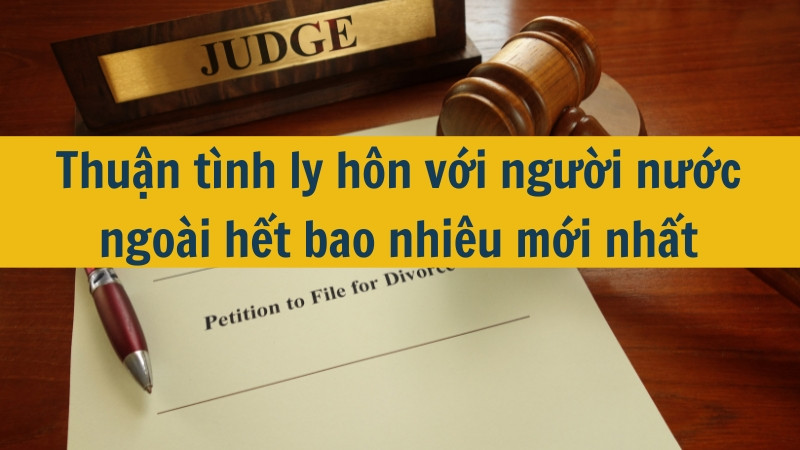
Thuận tình ly hôn với người nước ngoài hết bao nhiêu mới nhất 2025?
Quy trình ly hôn vốn đã phức tạp, lại càng trở nên nan giải hơn khi có sự tham gia của công dân nước ngoài. Vậy, thủ tục ly hôn thuận tình với người nước ngoài sẽ mất bao lâu để hoàn tất? Bài viết này sẽ giúp bạn giải đáp thắc mắc này, cung cấp những thông tin mới nhất về thời gian giải quyết vụ án ly hôn thuận tình có yếu tố nước ngoài tại Việt Nam năm 2025. 20/12/2024Trình tự, thủ tục chuẩn bị hồ sơ thuận tình ly hôn với người nước ngoài mới nhất 2025
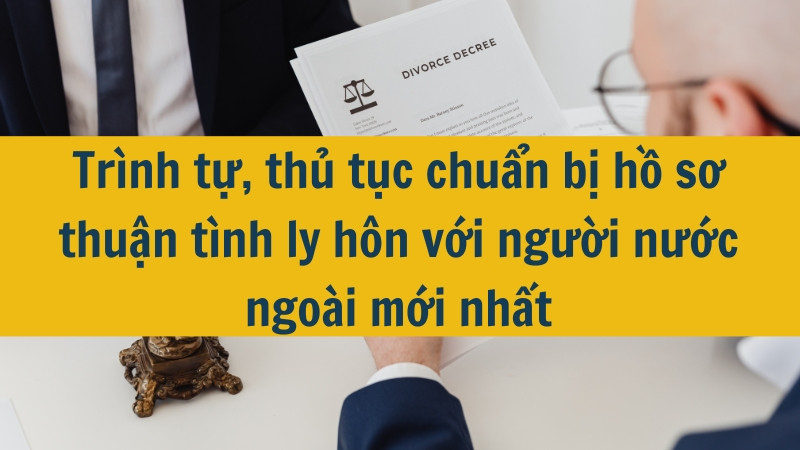
Trình tự, thủ tục chuẩn bị hồ sơ thuận tình ly hôn với người nước ngoài mới nhất 2025
Việc ly hôn với người nước ngoài ngày càng trở nên phổ biến trong xã hội hiện đại. Tuy nhiên, thủ tục ly hôn thuận tình với người nước ngoài khá phức tạp và đòi hỏi nhiều giấy tờ. Bài viết này sẽ hướng dẫn bạn chi tiết về trình tự, thủ tục và hồ sơ cần chuẩn bị khi muốn ly hôn thuận tình với người nước ngoài, giúp bạn nắm rõ quy trình và chuẩn bị đầy đủ trước khi tiến hành thủ tục. 20/12/2024Có được quyền ly hôn khi một bên ở nước ngoài không mới nhất 2025?
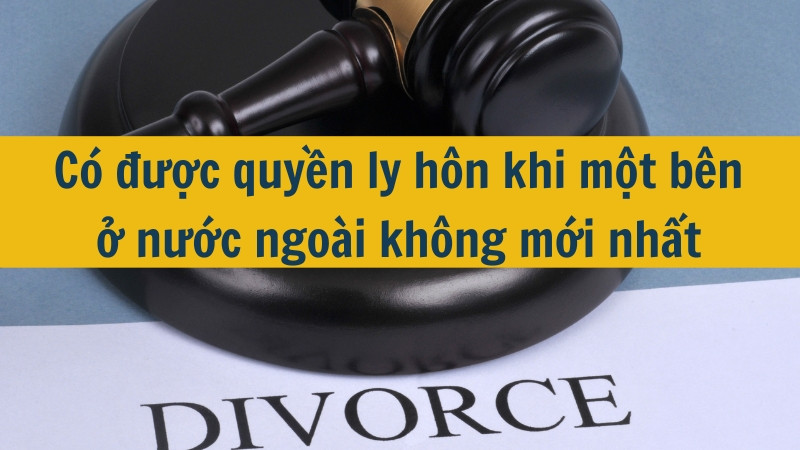
Có được quyền ly hôn khi một bên ở nước ngoài không mới nhất 2025?
Trong thời đại toàn cầu hóa, hôn nhân quốc tế ngày càng phổ biến. Tuy nhiên, không phải mối tình nào cũng có kết thúc viên mãn. Vậy, nếu một trong hai vợ chồng đang sinh sống ở nước ngoài, liệu có thể tiến hành thủ tục ly hôn hay không? Bài viết này sẽ giải đáp thắc mắc này, cung cấp thông tin chi tiết về quy định pháp luật mới nhất năm 2025. 20/12/2024Ly hôn đơn phương chồng đang ở nước ngoài mới nhất 2025?

Ly hôn đơn phương chồng đang ở nước ngoài mới nhất 2025?
Việc ly hôn với chồng đang ở nước ngoài là một vấn đề khá phức tạp và đòi hỏi nhiều thủ tục. Bài viết này sẽ hướng dẫn bạn chi tiết về quy trình ly hôn đơn phương khi chồng đang ở nước ngoài, giúp bạn hiểu rõ hơn về quyền lợi và nghĩa vụ của mình. 20/12/2024Hồ sơ và thủ tục ly hôn đơn phương có yếu tố nước ngoài năm 2025
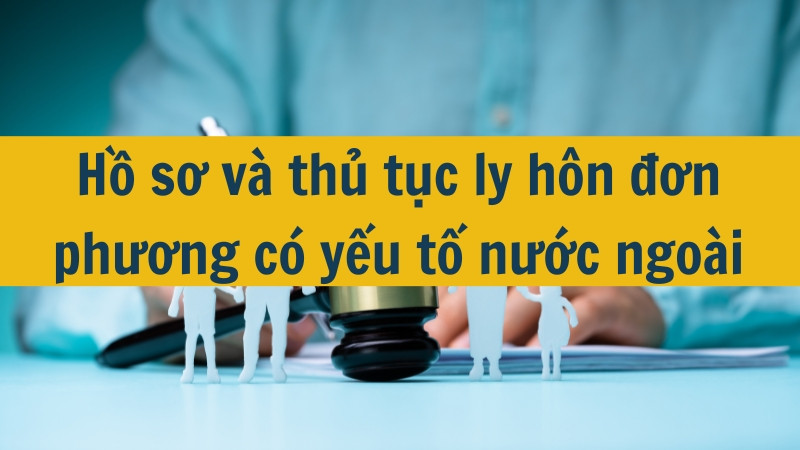
Hồ sơ và thủ tục ly hôn đơn phương có yếu tố nước ngoài năm 2025
Việc ly hôn với người nước ngoài ngày càng trở nên phổ biến trong xã hội hiện đại. Tuy nhiên, thủ tục ly hôn đơn phương có yếu tố nước ngoài lại khá phức tạp và đòi hỏi nhiều giấy tờ. Bài viết này sẽ cung cấp thông tin chi tiết về hồ sơ và thủ tục ly hôn đơn phương có yếu tố nước ngoài năm 2025, giúp bạn nắm rõ quy trình và chuẩn bị đầy đủ trước khi tiến hành thủ tục. 20/12/2024Người nước ngoài có được ly hôn ở Việt Nam không mới nhất 2025?
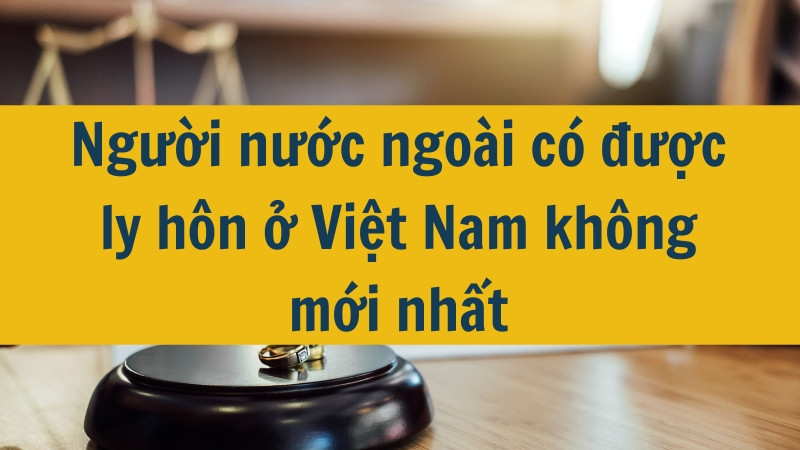
Người nước ngoài có được ly hôn ở Việt Nam không mới nhất 2025?
Việc ly hôn giữa công dân Việt Nam và người nước ngoài ngày càng trở nên phổ biến. Tuy nhiên, nhiều người vẫn băn khoăn không biết người nước ngoài có được quyền ly hôn tại Việt Nam hay không? Bài viết này sẽ giải đáp thắc mắc trên, cung cấp những thông tin chính xác và cập nhật nhất về vấn đề này vào năm 2025. 20/12/2024Ly hôn với người nước ngoài mất bao lâu mới nhất 2025?
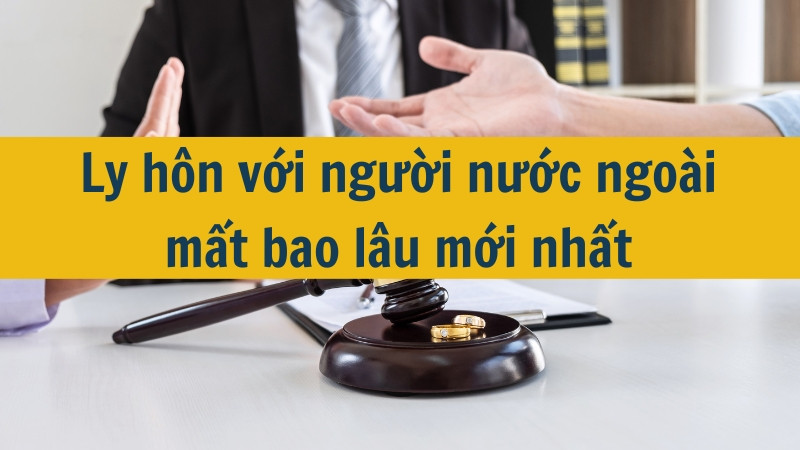
Ly hôn với người nước ngoài mất bao lâu mới nhất 2025?
Quy trình ly hôn vốn đã phức tạp, lại càng trở nên nan giải hơn khi có sự tham gia của công dân nước ngoài. Vậy, việc ly hôn với người nước ngoài sẽ mất bao lâu để hoàn tất thủ tục? Bài viết này sẽ giúp bạn giải đáp thắc mắc này, cung cấp những thông tin mới nhất về thời gian giải quyết vụ án ly hôn có yếu tố nước ngoài tại Việt Nam năm 2025. 20/12/2024Thẩm quyền giải quyết ly hôn với người nước ngoài mới nhất 2025
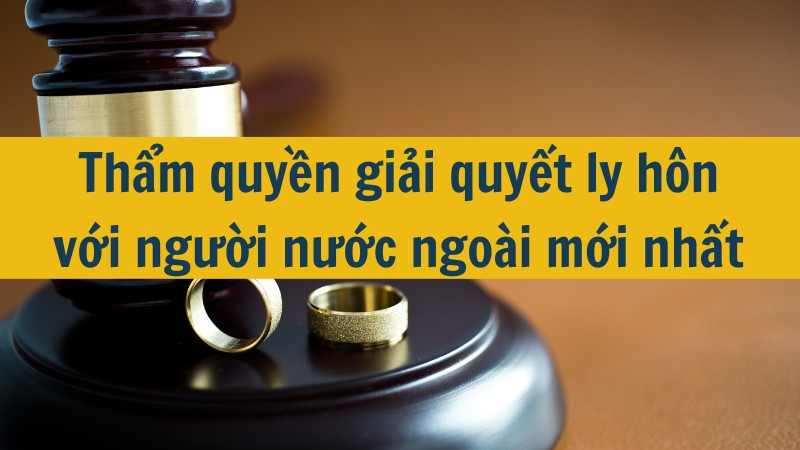
Thẩm quyền giải quyết ly hôn với người nước ngoài mới nhất 2025
Trong bối cảnh hội nhập quốc tế ngày càng sâu rộng, việc kết hôn giữa công dân Việt Nam và người nước ngoài trở nên phổ biến hơn. Tuy nhiên, khi hôn nhân đổ vỡ, vấn đề về thẩm quyền giải quyết ly hôn lại đặt ra nhiều thách thức. Bài viết này sẽ đi sâu phân tích các quy định mới nhất về thẩm quyền giải quyết ly hôn với người nước ngoài tại Việt Nam năm 2025, nhằm cung cấp thông tin hữu ích cho những người đang gặp phải tình huống này. 20/12/2024Mẫu đơn ly hôn với người nước ngoài và hướng dẫn chi tiết cách viết mới nhất 2025?


 Bộ luật tố tụng dân sự 2015 (Bản Word)
Bộ luật tố tụng dân sự 2015 (Bản Word)
 Bộ luật tố tụng dân sự 2015 (Bản Pdf)
Bộ luật tố tụng dân sự 2015 (Bản Pdf)